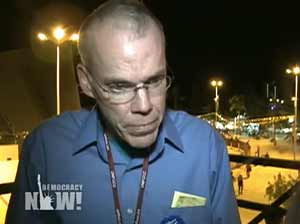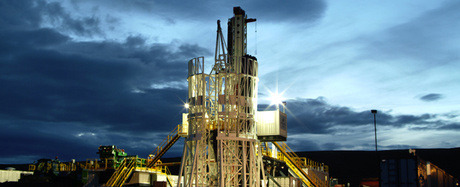WILLIAMSPORT, Pa. -- Halliburton is building a permanent outpost here on the edge of a one of the 21st century's biggest energy booms.
...Halliburton is a ubiquitous presence in the world's biggest oil fields. For the past two months, it has defended itself against charges that shoddy cement work contributed to a methane blast that sank BP's rig in the Gulf of Mexico and killed 11 people. As long as the well keeps gushing, public anger could weaken America's appetite for offshore drilling.
But far from the Gulf Coast and outside of the media spotlight, Halliburton and the oil and gas industry are spending billions of dollars in preparation for decades of drilling in the Marcellus Shale. The 95,000-square-mile sheet of natural gas-rich sediment sprawls across Pennsylvania, southern New York, West Virginia and eastern Ohio.
...Energy companies from India and Japan are dumping shareholder wealth into Appalachian gas production. In February, Japan's Mitsui & Co. entered a $1.4 billion joint venture with Anadarko Petroleum Corp.
Pittsburgh-based Atlas Energy Inc. in April formed a $1.7 billion partnership with Reliance Industries Ltd., the largest private-sector company in India. The conglomerate is controlled by Indian billionaire Mukesh Ambani, who has been pushing the company to secure lucrative energy investments outside of India.
"In the last few years, we realized we had this extremely valuable asset," says Jeff Kupfer, senior vice president of Atlas. "We needed a lot of capital to develop it." Once Atlas put out a feeler, the Marcellus prospect attracted attention from the world's major oil and gas companies. "There was something in the chemistry with Atlas and Reliance."
Hundreds of millions of dollars in grants from major oil companies may have compromised the ethics of energy research at such institutions as UC Berkeley, UC Davis, Stanford and Cornell.
Cornell is considering leasing some of its land holdings to natural gas drillers. SUNY Binghamton signed a $1.4 million dollar gas lease in 2008.
See: Editorial - A Decision Above Reproach | The Cornell Daily Sun.
See: Lee Fuller. "HF 101: As Cornell Begins Study of Shale Gas Exploration, Energy In Depth Offers Itself Up as Resource for Ad Hoc Panel". Energy in Depth.
Read the full report here:
According to the 212-page study, released by the Center for American Progress, a Washington-based think tank, such companies as BP, Chevron, and ConocoPhillips have funded more than $800 million in potentially compromised research with few protections for academic independence.
For example, since 2002, Stanford has received $225 million from a consortium led by ExxonMobil to study technology to curb greenhouse gas emissions. The company operates refineries, oil drilling facilities, tankers and gas stations, making it a major emitter of carbon dioxide and other greenhouse gases globally.
As part of the Stanford contract, the industry controls all four voting seats on the research alliance's governing body, and peer review of faculty research proposals is done "at the discretion of industry sponsors," the report says.
...this report represents the first time independent analysts have systematically examined a set of written university-industry agreements within a specific research area—in this case, the energy R&D sector—to evaluate how well they balance the goals of the corporate sponsors to produce commercial research that advances business profits with the missions of American universities to perform high-quality, disinterested academic research that advances public knowledge for the betterment of society.
See: GCEP Director Sally M. Benson responds to Center for American Progress report: More
See: DemocracyNow!: Big Oil Goes to College: BP, ExxonMobil, Chevron, Shell Fund & Influence Research at Major Universities
See: DemocracyNow! Transcript on truth-out.org.
See: Helene Cooper and John M. Broder. "BP’s Ties to Agency Are Long and Complex". May 26, 2010. NYT.
Hopefully, this NYT “mention” will draw some much-needed media attention to the actual contents of my own report, which examines university-industry alliances to finance energy research on campus, and raises questions about whether the current structure of these alliances adequately protects the universities’ academic mission and their ability to carry out independent, high-quality, reliable, public-good research. This article today does not address these issues at all. But, helpfully, Cooper and Broder in their NYT story did note that BP, in a May 24th press release, has pledged $500 million for “Independent Research into Impact of Spill on Marine Environment,” with the first grants going to the University of Louisiana. It looks like the iron is hot to look more deeply at university-industry research partnerships of this kind. – Jennifer
Media reports indicate the University of California system may be on the verge of signing a contract to create the proposed Energy Biosciences Institute (EBI) with BP. It is obviously a matter of urgent priority for the health of the planet to promote research and innovation related to alternative energy, and it is imperative that public research institutions direct major new resources to such endeavors. It is not at all obvious, however, that public institutions should do this in collaboration with giant oil companies that are contributing massively to climate change.
At minimum, such collaborations require intense scrutiny and informed debate. The prospect of giant carbon polluters directing research related to and gaining control of key energy technologies is very troubling -- especially when the research is conducted at, and the technologies are developed in collaboration with, public institutions. In this regard, the details of the UC-BP research agreement are of great importance. They will specify how research priorities are to be established, and how the fruits of the research collaborationare to be managed and controlled.
See: LSU News. June 15, 2010. "LSU Receives $5 Million From BP to Fund Spill-Related Research Grant to support studies in everything from human and environmental impact to engineering solutions".
The funds will come from BP’s $500 million Gulf of Mexico Research Initiative, or GRI, which will support universities in the Gulf area in research on the fate and effects of oil, dispersed oil and dispersants.
Silhouetted against the sky at dusk, excess steam, along with non-scrubbed pollutants, spew from the smokestacks at Westar Energy's Jeffrey Energy Center coal-fired power plant near St. Marys, Kan. Credit: AP Photo/Charlie Riedel.
In the name of job creation and clean energy, the Obama administration has doled out billions of dollars in stimulus money to some of the nation’s biggest polluters and granted them sweeping exemptions from the most basic form of environmental oversight, a Center for Public Integrity investigation has found.
The administration has awarded more than 179,000 “categorical exclusions” to stimulus projects funded by federal agencies, freeing those projects from review under the National Environmental Policy Act, or NEPA. Coal-burning utilities like Westar Energy and Duke Energy, chemical manufacturer DuPont, and ethanol maker Didion Milling are among the firms with histories of serious environmental violations that have won blanket NEPA exemptions...
...Documents obtained by the Center show the administration has devised a speedy review process that relies on voluntary disclosures by companies to determine whether stimulus projects pose environmental harm. Corporate polluters often omitted mention of health, safety, and environmental violations from their applications.
Related Stories:
NEPA Exemptions: The Dirty Dozen List
Wisconsin Firm Receives Energy Grant Despite Chronic Pollution Problems
See: Pollution in Your Community | Scorecard
See: A Life’s Value May Depend on the Agency, but It’s Rising
See: Climate Co-benefits and Child Mortality Wedges
See: U.S. Environmental Protection Agency (EPA): Hydraulic Fracturing Study (2010-2012)
Democracy Now! caught up with McKibben at the Cancún Climate Conference in Mexico. We asked for his reaction to the diplomatic cables released by WikiLeaks showing how the U.S. manipulated last year’s climate talks in Cancún.
Some of the new data [Wikileaks] coming out today makes it clear that everyone’s suspicion that the U.S. was both bullying and buying countries into endorsing their do-little position on climate were even sort of worse than we had realized...
...They [The U.S. Congress] think because they can change the tax code, they can change the laws of nature...
...this U.N. process, has been going on forever, and it’s getting nowhere, and it’s not going to get anywhere substantive, until we have some power from the outside to push it.
"It’s just like a family reunion aboard the Titanic, you know?" And that’s sort of what it feels like. We can’t keep doing this. Until we can build some power outside of these arenas to actually push these guys, you know, this is—in the end, it’s not about how well people are communicating or how great the policy papers are. It’s on who has the power. And at the moment, that power rests in the hands of the fossil fuel industry and their allies in governments around the world.
And until we build some independent outside movement power to push back, then we’re never going to get—we’re going to get scraps from the table, at the very best.
See: Damian Carrington. "WikiLeaks cables reveal how US manipulated climate accord." The Guardian.co.uk. 2010-12-03.
See: Ian Traynor. "WikiLeaks cables: Cancún climate talks doomed to fail, says EU president." The Guardian.co.uk. 2010-12-03.
BJ is one of the large companies being investigated by the U.S. House Energy and Commerce Committee to see if the gas extraction method known as hydraulic fracturing, or fracking, is a hazard to groundwater drinking supplies.
The Houston Chronicle reported that Texas Democratic gubernatorial nominee Bill White, 2010, may have had a conflict of interest during his term as mayor of Houston. Bill White earned more than $2.6 million serving on the board of a gas well servicing company that now is part of a congressional investigation into possible groundwater contamination.
White, who made cleaning Houston's polluted air a hallmark of his tenure as Houston's mayor, has been on the board of BJ Services Co. since 2003, the year he was elected, earning more than $627,000.
White also received almost $830,000 in stock and another $245,000 in stock options. He will receive an additional $180,000 in stock and a retirement payout of $783,000 if the firm's merger with Baker Hughes is approved by shareholders Friday.
See: 03/31/2010--Baker Hughes and BJ Services Stockholders Approve Merger
From the web site: "BJ Services has earned a reputation for providing reliable fracturing services for virtually every major shale oil and gas operator. Since 1981, our skilled engineers and crews have successfully designed and pumped more than 21,500 shale frac treatments around the world. We know that every shale formation is different and we offer the most advanced fracturing technologies–the right fluids, proppants and equipment–needed to “crack the code” for optimum frac designs and operations."
Black Warrior Riverkeeper's mission is to protect and restore the Black Warrior River and its tributaries. The Black River Watershed in Alabama provides water to over a million people.
We are a citizen-based nonprofit organization dedicated to improving water quality, habitat, recreation, and public health throughout our patrol area, the Black Warrior River watershed. This vital river basin is home to over a million people and is entirely contained within Alabama.
There are over four thousand coalbed methane wells in the Black Warrior River watershed. Tens of thousands of acres are leased to this practice, creating a massive network of roads and well pads. The extraction of coalbed methane involves a process known as hydraulic fracturing.
See: Affirming Gasland.
See: Max Shelby. Dec. 19, 2010. Black Warrior Riverkeeper Newsletter--Sheperd's Bend Coal Mine Fight Continues. Vincent Alabama Confidential.
Texas based blogger "TXsharon".
"I'm a landowner and a mineral owner on top of the Barnett Shale.
If you want to know how I became known as TXsharon and why industry tries to discredit me by calling me a "left-wing lunatic with a socialists agenda," you can read about it here: How I became a "Far Left Radical with a socialist agenda," etc. And, yes, I'm a mineral owner.
In January 2010, I started working for Texas Oil and Gas Accountability Project on a very part-time basis. I am likely the only person in Texas who gets paid for helping Texans who are negatively effected by oil and gas development. We hope to make my position full-time soon."
See: Cheney Helped Halliburton Hide Secrets About Dangerous Chemicals in YOUR Drinking Water. Tue Nov 25, 2008 at 08:36:40 AM CST.
See: "Doodygate".
See TxSharon's Diary on the Daily Kos.
See Barnett Shale: Aerial View and Cattle Drink Drilling Waste
After BP’s Texas City, Tex., refinery blew up in 2005, killing 15 workers, the company vowed to address the safety shortfalls that caused the blast.
The next year, when a badly maintained oil pipeline ruptured and spilled 200,000 gallons of crude oil over Alaska’s North Slope, the oil giant once again promised to clean up its act.
In 2007, when Tony Hayward took over as chief executive, BP settled a series of criminal charges, including some related to Texas City, and agreed to pay $370 million in fines. “Our operations failed to meet our own standards and the requirements of the law,” the company said then, pledging to improve its “risk management.”
Despite those repeated promises to reform, BP continues to lag other oil companies when it comes to safety, according to federal officials and industry analysts. Many problems still afflict its operations in Texas and Alaska, they say. Regulators are investigating a whistle-blower’s allegations of safety violations at the Atlantis, one of BP’s newest offshore drilling platforms in the Gulf of Mexico.
Now BP is in the spotlight because of the April 20 explosion of the Deepwater Horizon, which killed 11 people and continues to spew oil into the ocean. It is too early to say what caused the explosion. Other companies were also involved, including Transocean, which owned and operated the drilling rig, and Halliburton, which had worked on the well a day before the explosion.

BP, based in London, has repeatedly asserted that Transocean was solely responsible for the accident.
See: BP to pay $15 million for Texas air pollution violations. Reuters. Sept. 30, 2010.
See: Cain Burdeau. "Scientists Find Damage to Coral Near BP Well." AP. Coastal Care. Nov. 6, 2010.
BP's Tony Hayward tells World Economic Forum of 'game changer' technique to serve world's energy needs.

Excitement in the industry over "unconventional" gas supplies has led to a wave of investment in America which Tony Hayward, BP's chief executive, believes could eventually spread around the world.
BP inherited a major stake in shale operations when it took over Amoco 12 years ago, but has added to that by spending $1.75bn buying shale interests from rival Chesapeake Energy in the summer of 2008. Last November BP showed its determination to extend the use of the techniques when it signed a production-sharing agreement with the government of Indonesia to exploit new reserves in Kalimantan.
See: BP Deepwater Horizon Committee Hears From Oil Industry Executives
See: National Commission on the BP Deepwater Horizon Oil Spill and Offshore Drilling
See: Before the Big Spill
In a speech in Buenos Aires last year, BP Chief Executive Tony Hayward called this "a quiet revolution...in the gas fields of North America."
New techniques like hydraulic fracturing and horizontal drilling are opening up new gas resources that could last the U.S. between 50 and 100 years, he said.
"One field where these techniques were pioneered--the Barnett Shale near Fort Worth in Texas--has almost single-handedly turned around the production of natural gas in the U.S.," Hayward said.
BP made its entry into U.S. shale gas in 2008 when it acquired 90,000 acres of the Arkoma Basin Woodford Shale play and 135,000 acres of the Fayetteville shale from Chesapeake Energy for $2.85 billion in cash.



















